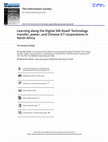Papers by Tinhinan El Kadi

The Information Society, 2024
While much attention has been paid to how China’s rise as a digital superpower could
threaten US ... more While much attention has been paid to how China’s rise as a digital superpower could
threaten US hegemony over cyberspace, much less has been written on what the Digital Silk
Road, or the presence of Chinese tech firms in developing countries more broadly, means for
technological upgrading and development. This article contributes to filling this gap by
investigating the technology spillovers emanating from two Chinese tech giants – Huawei
and ZTE – in Algeria and Egypt. Using a political economy framework that combines insights
from structuralist economic development and techno-politics and drawing on over 70
semi-structured interviews and field-observations, it argues that despite localizing activities
that bear the promise of generating significant linkages, the two Chinese tech firms created
no meaningful learning opportunities for domestic entities that contribute to technological
upgrading. What could at first seem like developmental connections that promote technology
transfers are found to be linkages diffusing Chinese infrastructures, hardware, software,
processes, and standards that shape distinct digital systems. Without pro-active policies from
host governments, the Digital Silk Road risks creating new technological dependencies;
locking local ICT actors into activities and relationships captured and defined by Chinese tech
giants.










Uploads
Papers by Tinhinan El Kadi
threaten US hegemony over cyberspace, much less has been written on what the Digital Silk
Road, or the presence of Chinese tech firms in developing countries more broadly, means for
technological upgrading and development. This article contributes to filling this gap by
investigating the technology spillovers emanating from two Chinese tech giants – Huawei
and ZTE – in Algeria and Egypt. Using a political economy framework that combines insights
from structuralist economic development and techno-politics and drawing on over 70
semi-structured interviews and field-observations, it argues that despite localizing activities
that bear the promise of generating significant linkages, the two Chinese tech firms created
no meaningful learning opportunities for domestic entities that contribute to technological
upgrading. What could at first seem like developmental connections that promote technology
transfers are found to be linkages diffusing Chinese infrastructures, hardware, software,
processes, and standards that shape distinct digital systems. Without pro-active policies from
host governments, the Digital Silk Road risks creating new technological dependencies;
locking local ICT actors into activities and relationships captured and defined by Chinese tech
giants.
threaten US hegemony over cyberspace, much less has been written on what the Digital Silk
Road, or the presence of Chinese tech firms in developing countries more broadly, means for
technological upgrading and development. This article contributes to filling this gap by
investigating the technology spillovers emanating from two Chinese tech giants – Huawei
and ZTE – in Algeria and Egypt. Using a political economy framework that combines insights
from structuralist economic development and techno-politics and drawing on over 70
semi-structured interviews and field-observations, it argues that despite localizing activities
that bear the promise of generating significant linkages, the two Chinese tech firms created
no meaningful learning opportunities for domestic entities that contribute to technological
upgrading. What could at first seem like developmental connections that promote technology
transfers are found to be linkages diffusing Chinese infrastructures, hardware, software,
processes, and standards that shape distinct digital systems. Without pro-active policies from
host governments, the Digital Silk Road risks creating new technological dependencies;
locking local ICT actors into activities and relationships captured and defined by Chinese tech
giants.